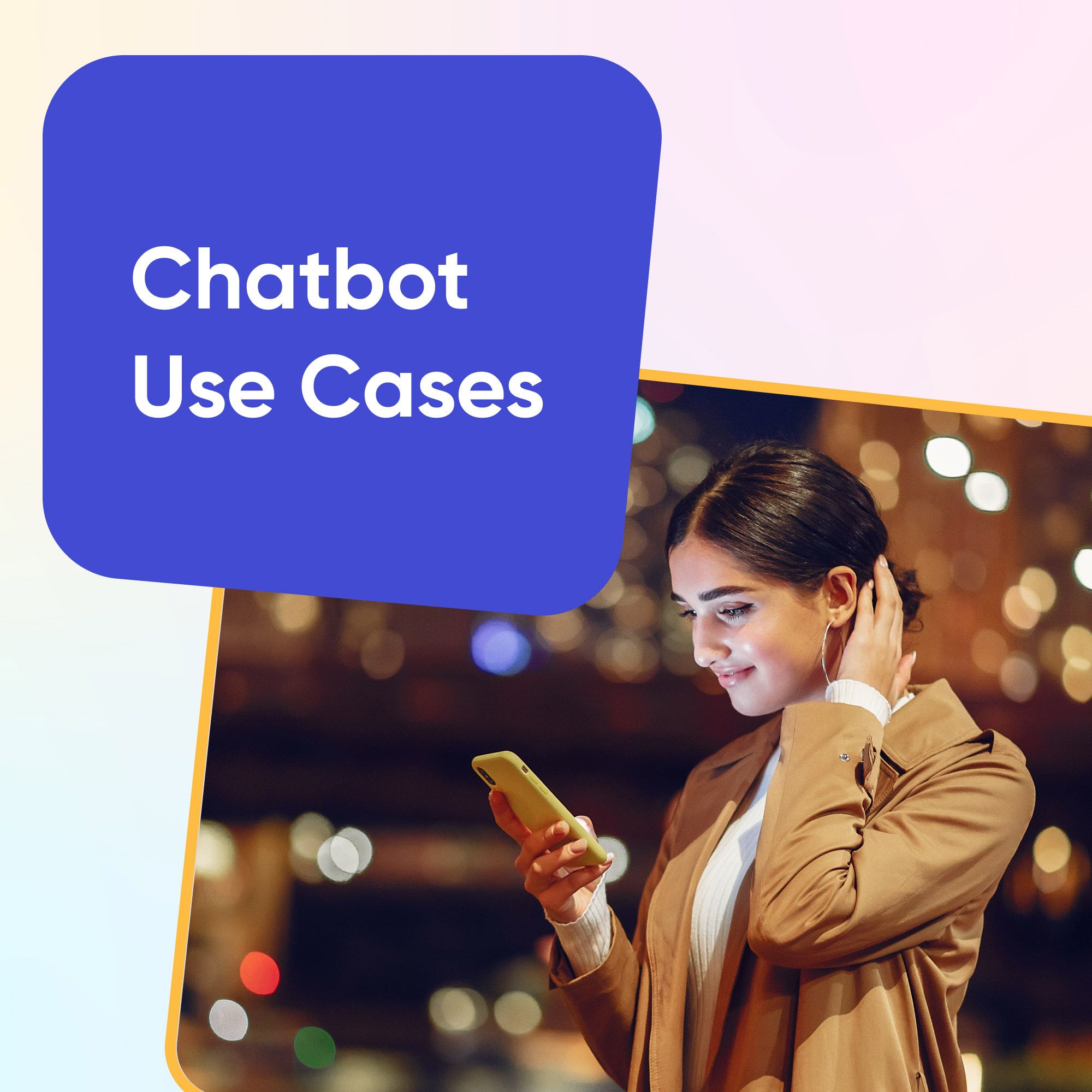Imagine you have an assistant who is online around the clock and is ready and available to answer all your questions, solve all your problems, and complete all your tasks effectively. That is the magic of AI chatbots. These intelligent bots powered by AI work wonders because they are going to change the way businesses will ever have to connect with clients or run their operations.
Everything is done in a single round-the-clock chat where you can perform customer support or even personalise shopping experiences. Whether you're in e-commerce, finance, or education, this blog will offer valuable insights into the power of chatbots.
Get the awesome AI-powered chatbot solution here at Tring AI. Book a chatbot online free demo today!
What is chatbot in AI?
Chatbots in AI are basically automated software applications designed to simulate the ability to converse just like a human being. Through artificial intelligence, these AI chatbots process user queries in real time using natural language processing to interpret, understand, and respond to the user.
Thus, AI-based chatbots are capable of having interactive conversations through voice or text messages on various tasks, including customer care, information retrieval, and process automation.
Suggested Read: What is a Chatbot? Chatbot Meaning, Uses, and Future of Chatbots
Discover Chatbot Use Cases in Various Industries
1. AI Chatbot Uses in Customer Support and Service
Always Available: AI Chatbots are there for customers at any time of the day or night, regardless of whether the business is open or not.
FAQs: Besides direct assistance, they can provide service on frequently asked questions, offering short answers to common topics like shipping policy, returns, or even troubleshooting.
Complaint Management: AI Chatbots can handle basic complaints and can track the status of complaints for purposes of follow-up.
Personalized Support: When integrated with customer data systems, chatbots AI can provide individualized advice and can recommend products or services previously encountered or purchased.
Proactive customer interaction: With the help of AI chatbots, timely updates, reminders, or alerts regarding order status, renewals, or any potential issue such as a low stock or service disruption are given to the customers.
2. Chatbot Uses in E-commerce & Retail
Product Recommendations: AI-powered bots facilitate the shopping experience for a customer by suggesting products based on their preferences, purchase history, or browsing behaviour.
Tracking Orders: AI chatbots will automatically notify the customer about their order's progress by providing shipping details, tracking numbers, and estimated delivery time.
Paying Help: These AI chatbots also provide some payment systems so that the user can buy through the interface of the chatbot with no real call to action.
Recover Abandoned Carts: It can proactively engage a customer who has walked away from their shopping cart and use incentives, discounts, or reminders to entice them back into completing their purchase.
Customer Comments & Reviews: AI chatbots encourage customers to give their comments or ratings after purchase to identify trends, concerns, and improvements in the whole shopping experience.
Suggested Read: Ecommerce Chatbots, their Benefits & the Best Ecommerce Chatbots in the Market
3. Chatbot Uses in Marketing and Lead Generation
Lead Qualification: Get in touch with website visitors to qualify leads, collect contact info, and schedule some follow-up sessions.
Customer Surveys and Feedback: Gathering feedback on the product or service with the aim of developing a customer-oriented approach and ultimately increasing satisfaction.
Product Demos and Info: Provides more detail of the product and demos, and answers the questions relating to the product.
Personalised Marketing Campaigns: Sending messages or offers that are specific to a user, depending on the user's data, preferences, and browsing history.
Geo-targeted Campaigns: AI chatbots use geolocation data to send location-based offers, promotions, and event details, enhancing user engagement.
Suggested Read: How to Use Chatbot in Marketing for Business? A Guide to Chatbot Marketing Strategy
4. Chatbot Uses in Human Resources and Recruitment
Screening job candidates: Initial interviews will be conducted, and resume screening will also be performed through chatbots.
Employee Onboarding: New employee onboarding has been made easy because of this service. It can answer most questions about company policies, benefits, and HR forms.
Employee Support: It answers HR-related payroll, leave balances, or company benefits-related questions.
Performance Management: Obtain employee feedback, observation of performance metrics, and ongoing assistance in development and career growth.
Training Assistance: Assists employees in accessing and navigating training resources.
5. Chatbot Uses in Banking and Financial Services
Customer Service: Answers enquiries regarding account balances, transactions, and loan status to minimise waiting time.
Fraud Prevention: Keeps an eye on accounts for suspicious activity and alerts users in real-time to safeguard their interests.
Financial planning: Provides personalized advice around budgeting, saving, and investing based on the financial behaviour of individuals.
Loan Application Assistance: Guides customers through the loan application process, eligibility verification, and document submission.
Transaction administration: Assists users in carrying out transactions, tracking their expenditures, and making payments through chats.
6. Chatbot Uses in Real Estate
Property Search: Displays properties according to preferred location, budget, and type; streamlining property searching for people.
Lead Qualification: This collects primary data about the prospective buyer to appropriately enter the lead to be followed up by the agent.
Availability Round-the-clock: Answers to questions about property details, pricing, and availability for making the customer always engaged around the clock.
Showing Schedulers: Assist in scheduling viewings for properties, thus facilitating the connection between agents and buyers.
Virtual Tours: This takes property tours or creates 3D walkthroughs of properties so that searching can be more interactive.
Suggested Read: Power of Real Estate Chatbots: How Does a Chatbot for Real Estate Benefit Your Business Operations?
7. Chatbot Uses in Telecommunication
Technical Support: Providing self-service guided steps to resolve the most common connectivity issues.
Billing Enquiries: Answering billing questions and payments; provides detailed account breakdowns.
Plan Recommendations: Advising customers on the best telecom plans based on their usage patterns. This helps customers maximize their subscriptions.
Service upgrade: Notify customers about available upgrades and new features, keeping them informed of the latest offers.
Customer Feedback: Collating feedback on the quality of services provided and customer satisfaction in turn helps telecom companies improve with customer feedback.
8. Government & Public Services
Government service information: providing pieces of information regarding the different governmental services, policies, and procedures.
Citizen Engagement: Helping citizens to report an issue, lodging a complaint, or accessing public records.
Form Filling Assistance: Helping the citizen in filling various government-required forms (which include taxes, social security, etc.).
Health updates: Provide updates on issues regarding public health or advisory issued by the government.
Assistance With Voting & Election: With the help of AI chatbots, voters can have access to details about the election dates, the locations of polling stations, and required documentation.
9. Chatbot Uses in Education and Learning
Education and Learning Assistance for Students: AI chatbots lend their support by offering students all the facilities needed for enquiries on academic issues—from selecting courses to keeping track of deadlines—and even discussing matters with the faculty.
AI-Powered Chatbots Personalized Learning: AI-powered chatbots create personalized learning materials, quizzes, and study guides for students according to their progress and needs.
Administrative: Answering questions about class schedules, exam dates, registration, and school policies.
Language Acquisition Activities: Students must keep conversing, correct any grammar, and add new vocabulary to acquire the language.
Progress Monitoring: Keeping an eye on students' academic performance, assignments, and deadlines.
10. Chatbot Uses in Health & Wellness
Appointment Scheduling: A chatbot can help a patient schedule an appointment, send a reminder, and even allow rescheduling so that a visit is not missed.
Symptom Checker: AI-based chatbots can ask a series of diagnostic questions, which allow users to determine their actual symptoms and conditions and thus suggest probable conditions or possible actions.
Medication Reminders: AI chatbots set up reminders for patients to take their medications or follow a prescribed course of treatment.
Mental Well-Being: Some AI chatbots provide emotional assistance, including strategies on coping or mindfulness exercises, while some other chatbots may just listen to the affected person.
Insurance Claims: These AI-based chatbots guide human users through insurance policies, help file claims, and reveal the state status for claims, making things much more transparent and easy.
Suggested Read: 11 Benefits of Chatbots for Healthcare Industry - Power of Bots in Medical Industry
11. Chatbot Uses in Travel and Hospitality
Booking and Reservations: Aid with reservation of flight, lodging, and activities and tailors advice according to something.
Customer Support: Provides an immediate response regarding its schedule, policies, and other travel-related enquiries.
Travel Itinerary Management: Helps travellers to draft and manage a complete itinerary with travel alerts and updates.
Post-travel engagement: feedback collection and promotions for future travel, creating better customer loyalty.
Local Recommendation: Provides localized sights, restaurants, and events for travellers to personalise their experience with the journey itself.
12. Chatbot Uses in Entertainment and Media
Content Recommendations: Suggests movies, music, games, events, etc. based on users' past activity and preferences.
Subscription Management: Provides assistance in managing subscriptions, payments, and account settings of media services.
Event Promotions: All about keeping users hooked with updates and an event around all new releases and exclusive content.
Customer Service: Improving users' overall satisfaction through enquiries-and-response processes regarding accounts, tech issues, or content availability.
Interactive Engagement: Declares quizzes, polls, or trivia to create interaction between users and the brand.
Tring AI Chatbot: Your 24/7 Digital Assistant
Tring AI Chatbot is an AI technology that provides customers with immediate automated responses to inquiries. From answering FAQs to handling service requests, it increases customer engagement and decreases the effort of manual input.
This chatbot's intuitive design guarantees excellent experience and personalized support, which improves operational efficiency since it is available all day long. It enables companies to respond quickly and accurately to customer demands while minimizing customer service costs and maximizing overall satisfaction.
Conclusion
Across all industries, right from healthcare to retail, banking, and education, etc., AI chatbots reduce operation costs, streamline processes, and transform the customer experience. In other words, AI chatbots help improve efficiency and satisfaction by providing personalized support, automating routine tasks, or offering real-time assistance for doing things faster and more efficiently.
As AI advances, chatbots will play a bigger role in enhancing business services, driving efficiency, and transforming customer interactions across industries, as exemplified by Tring AI in shaping the future of customer engagement. Book your demo now and start transforming your business today!
Want to explore more about chatbots and voice bots? For the latest scoop, visit our blogs.
FAQs on Chatbot Use Cases
What industries use chatbots the most?
AI chatbots are most commonly used in real estate compared with any other industry; they help these small businesses answer customer queries, and that would be crucial in closing a deal or renting out a unit. A chatbot implementation is a lot easier than one would think.
What is the main use of chatbots?
AI chatbots reduce the engagement costs of businesses between the customer and the company in a personalized way, without the involvement of humans. A majority of customer queries are common and straightforward, and hence businesses usually use FAQs and troubleshooting guides to solve such recurring queries.
What is the future use of chatbots?
According to a recent prediction from Gartner, by 2027 chatbots could reportedly be the preferred means of customer service in one out of four businesses globally, as adoption increased by 67%.
Which chatbot is best?
Tring AI boasts the best chatbot for the most advanced, reliable, and fully customisable chatbot solutions for a business. As one of the best applications of modern artificial intelligence, Tring AI seamlessly converges with customer interaction, real-time support, and effective automation as it meets specific business requirements.







